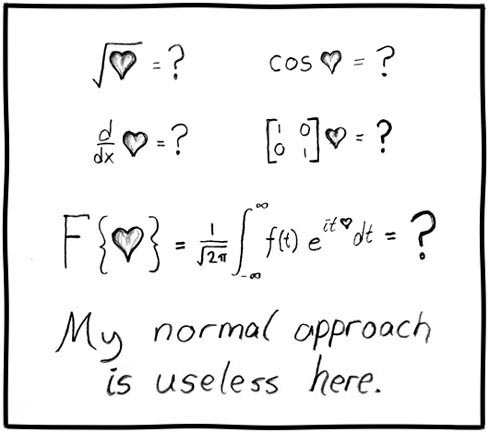
Prompt Images
3 Words, 2-ish {Marriages}, 1 Spouse, 0 {Weddings}: The Holy States of American Matrimony, Part 1
Popular culture (and neurology) would have you believe that men are just plain bad at anniversaries. They’re bad at remembering them, and even if they do, they still struggle to answer the question, “How long have you been together?” If nothing else, this should suggest that men aren’t the best at math after all.
Of course, don’t expect them to get the right gifts, either.

I think “plush” is the 6th anniversary gift.
So when I got married for the second time, I decided on the practical route. Why bother needing to remember two dates? I got married (again) a year to the date after my first marriage. Except I wasn’t really getting married again, because I hadn’t really been married in the first place. And I was marrying the same person that I didn’t really marry the first time.
Perhaps I should back up.
In mid-2008, I was wrapping up the final year of my master’s program in higher education. My then-long distance boyfriend told me that his family was moving to California from their Maryland home—and that he was moving with them.
My heart told me after I graduated, I should move too. My head said this would be a bad idea for my job search, that there was too much risk and uncertainty in moving across the country, that it was too early in our relationship to make such a huge move, and that in general I should never follow my heart.
For once in my life, I followed my heart.
At the time, California had just declared same-sex marriage legal. The state Supreme Court ruled that an earlier ban on same-sex marriage was unconstitutional, and same-sex couples began to get married. I wasn’t thinking of getting married at that point, but I had just emerged from a period of extended, anti-homosexual harassment while finishing my graduate degree. “After all,” I noted, “it might be nice to live somewhere I didn’t have to fear being myself.” And so I packed up the little I owned, in the summer of 2008, to move across the country and move in with my boyfriend.

I didn’t do the 867 hour hike. But it still felt as big as this.
That fall, California reversed course and stopped recognizing same-sex marriage. Opponents of marriage equality, recognizing that only an explicit ban in the California constitution would prevent future arguments for marriage equality on constitutional grounds, had been preparing an initiative that would elevate the ban from a law to a constitutional amendment. Thanks to California’s somewhat exasperating process of allowing nearly anything on a state ballot, the initiative (known nationwide as Proposition 8) succeeded and the California constitution now banned marriage between two people of the same sex. The impact would be felt across the nation, galvanizing many on both sides of the disagreement.
Against this backdrop, my boyfriend and I struggled to live our lives in an expensive state suffering through a recession. Within a couple of years, his family ended up returning to the East Coast. We said goodbye to his mother, his sister, and their dogs in the shaded parking lot of a strip mall near our apartment as they prepared to drive back across the country.
Suddenly we were on our own in California.
As time passed, and lowercase-w we realized that uppercase-W We weren’t going anywhere anytime soon, we began to talk more about our relationship. We talked about our future indirectly: the same way you might ask roundabout questions of something you see in the mall to get hints on if it might be a good birthday gift. We couldn’t be married, but California legally recognized same-sex domestic partnerships with all the protections and benefits of marriage at the state level.
Day by day, I grappled with the idea as an intellectual puzzle. Once I realized I needed more information, I made a list of all my questions and sought out a family lawyer to find out what it would mean to be domestic partners: what would happen if we crossed state lines into someplace that didn’t recognize our relationship, what would happen if one of us was injured or died, and what I should prepare to do if we did make Us official. To my insistently logical brain, questions couldn’t be approached until you were properly prepared. (This seemed like a bigger than average question, so it needed more than the usual preparation.)
However, the drawback of waiting to nail down all the details of anything is that there will always be a reason to wait to know more, to double check, and to confirm. In the world of science and logic in which I dwell, there are thresholds of risk and uncertainty that help you figure when things are “good enough.” Maybe you don’t know all the specifics yet, but you’ve calculated that you’re OK to get started.
Love doesn’t work like that.
One of my favorite and most geeky webcomics of all time neatly sums up my thoughts on the subject.
Inasmuch as anyone can ever know anything, I knew I wanted to be with my boyfriend. But because I didn’t know it, well… in short, I was stuck.
And so it went, until 2012 and a birthday trip to Las Vegas at the end of July. In the garden of the Bellagio casino at Las Vegas, my boyfriend—perhaps tired of waiting, but very definitely characteristically unbothered by unanswered questions—asked me to spend the rest of my life with him.
At that point, I didn’t have to figure anything else out. I was freed from taking the first step, which is always the hardest.
He wanted his life to be with me, and for perhaps the second time in my life, I trusted my heart to tell me that it was OK not to know what came next.
With the 3 words, “Yes, I will,” he and I became something other than boyfriends.
Exactly what that was, though, would prove challenging to define.
To be continued in Part 2.




